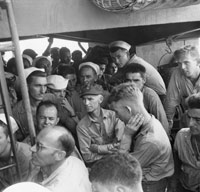Pyle describes what it’s like to return from a bombing run.
IN THE MARIANAS ISLANDS- (Delayed) – When you see a headline saying "Superforts Blast Japan Again" I hope you don’t get the idea that Japan is being blown sky high and that she’ll be bombed out of the war within another week or two. Because that isn’t the case. We are just barely starting on a program of bombing that will be long and tough. Even with heavy and constant bombing it would take years to reduce Japan by bombing alone. And our bombings are not yet heavy.
Too, we have lots of things to contend with. Distance is the main thing, and Jap fighters and ack-ack and foul weather are other things. The weather over Japan is their best defense. As one pilot jokingly suggested, "The Nips should broadcast us the weather every night and save both themselves and us lots of trouble."
The B-29 raids are important, just as every island taken and every ship sunk is important. But in their present strength it would be putting them clear out of proportion if you think they are a dominant factor in our Pacific war.
I say this not to belittle the B-29 boys, because they are wonderful. I say it because they themselves want it understood by the folks at home.
***
Their lot is a tough one. The worst part is that they’re over water every inch of the way to Japan, every inch of the way back. And, brother, it’s a lot of water. The average time for one of their missions is more than 14 hours.
The flak and fighters over Japan are bad enough, but that tense period is fairly short. They are over the empire for only 20 minutes to an hour, depending on their target. Jap fighters follow them only about 15 minutes off the coast.
What gives the boys the woolies is "sweating out" those six or seven hours of ocean beneath them on the way back. To make it worse, it’s usually at night.
Some of them are bound to be shot up and just staggering along. There’s always the danger of running out of gas from many forms of overconsumption. If you’ve got one engine gone, others are liable to quit.
If anything happens, you go into the ocean. That is known as "ditching." I suppose around a B-29 base you hear the word "ditching" almost more than any other word.
***
"Ditching" out here isn’t like "ditching" in the English Channel, where your chances of being picked up are awfully good. "Ditching" out here is usually fatal.
We have set up a search-and-rescue system for these "ditched" fliers, but still the ocean is awfully big, and it’s mighty hard to find a couple of little rubber boats. The fact that we do rescue about a fifth of our "ditched" fliers is amazing to me.
Yes, that long drag back home after the bombing is a definite mental hazard, and is what eventually makes the boys sit and stare.
The other morning after a mission, my friend Maj. Gerald Robertson was lying in his cot resting and reminiscing. And he said:
"You feel so damn helpless when the others get in trouble. The air will be full of radio calls from those guys saying they’ve only got two engines or they’re running short on gas.
"I’ve been lucky and there I’ll be sitting with four engines and a thousand gallons extra of gas, I could spare any of them one engine and 500 gallons of gas if I could just get it to them. It makes you feel so damn helpless."



